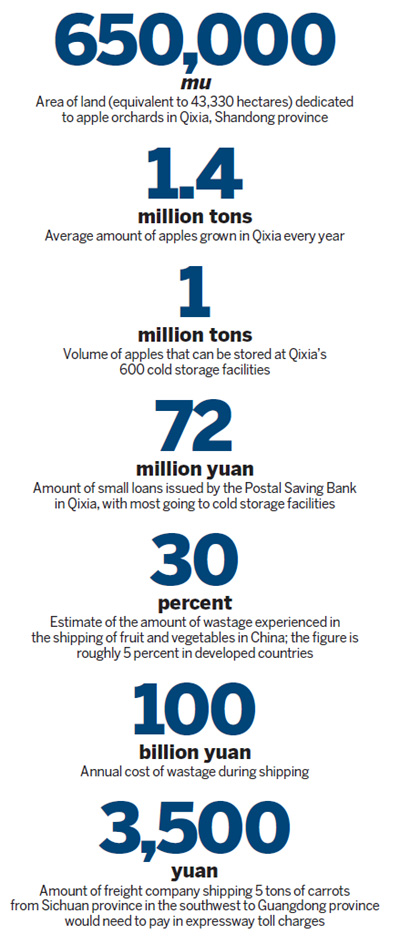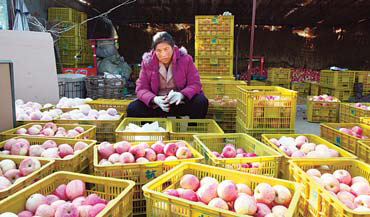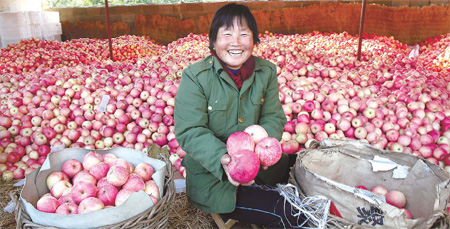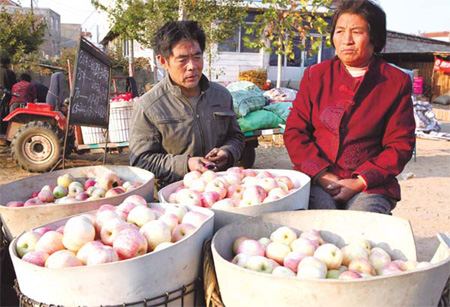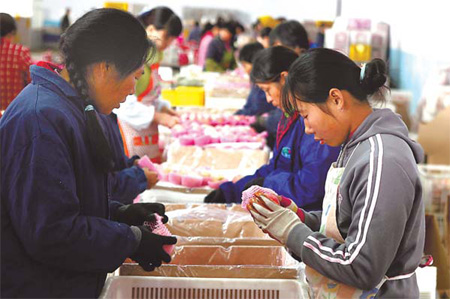Focus
Fruits give farmers juicy bite of profits
By Duan Yan in Qixia and Hu Yongqi in Beijing (China Daily)
Updated: 2010-11-04 07:55
 |
Large Medium Small |
|
A retailer categorizes apples before packaging them for sale in a market in Qixia, Shandong province, on Oct 27. [Photo/China Daily] |
Price rise means rich pickings for growers, report Duan Yan in Qixia and Hu Yongqi in Beijing.
Lu Guoqi could not stop smiling. Sitting behind the bars of a tricycle loaded with apples, the grocer has been making a tidy profit in recent weeks.
"The price has never been so high," said the 58-year-old from Qixia in Shandong province. This time last year, he was making just 2.1 yuan (31 US cents) for every jin (a Chinese measurement equal to 500 grams) of apples. Today, the price is 3.1 yuan.
Apples are the latest in the growing number of fruits and vegetables that have seen sudden price hikes over the last 12 months, with others including garlic, mung beans and cabbages.
Although many of the voices in the marketplace and in the media are laying the blame on opportunist speculators, experts say their involvement is only one of the factors driving up prices.
Qixia, often referred to as "the city of apples", is one of three major areas for growing the fruit in China (the others being in Hebei and Shaanxi provinces). With 650,000 mu (43,330 hectares) of land, farmers here produce 1.4 million tons of high-quality apples every year.
Yet, regular wholesale buyers say the fruit has been snapped up quicker than usual this year, leaving them with slim pickings.
Sun Shixian, who has been trading apples since 1997, looked far from happy as he held a basket of bruised apples that had cost him 2 yuan a jin. "This kind of apple was always considered 'damaged goods' but now the market standard has changed," he said.
Officials with Qixia's fruit industry bureau attributed the drop in quality to cold weather in last spring, which also affected yields, with production falling by 100,000 tons. (Although the Shaanxi authorities deny annual apple yields have fallen, buyers claim they are down at least 30 percent.)
Droughts and floods this year in South China have also hit growers, reducing their output, which is also contributing to the demand for alternatives.
"A shortage of other fruits means more buyers turn to apples," said Sun. "More disasters next year will likely push prices even higher."
What is worse for old hands like Sun is that the shortage has attracted many new players to enter the game. Although it is hard to estimate the number of buyers this year, industry analysts described the market as "wide open" due to the low investment threshold for agricultural products.
"Speculators figure out the overall supply and demand of agricultural products and start collecting (those in short supply)," said Li Minghui, a research fellow at the Chinese Academy of Agricultural Sciences' institute of agricultural economics and development.
Sun Fengjuan, who used to trade in corn and rice, is one of the new players. She arrived in Qixia on Oct 1 to buy 300 tons of apples.
"But the price kept rising and the quality was not that good, so I decided to be cautious and just get 100 tons," said the businesswoman from Jiamusi in Heilongjiang province.
"I'm not sure I can make a profit from the apple business but I'm already here, so I'll take the bet," she added.
As the produce being gambled on are non-staple foods in China, researcher Li said the government does not monitor the changing prices or keep national reserves.
This allows batches of fruit to be freely traded - often before it even ripens.
In August, wholesaler Han Lizhi said she paid 260,000 yuan ($39,000) to reserve 350 mu (23 hectares) of farmland in Jilin province growing Chinese cabbage. However, two months later, a broker offered her more than 400,000 yuan for entire yield, predicted to be 1,300 tons.
Han, who has run a stall at Shuangxing Market in Dalian, Liaoning province, for 26 years, declined the offer, believing an expected decrease in production "would push prices even higher".
She was right. On Oct 19, the price of Chinese cabbage rose from 0.8 yuan a kilogram to 1.1 yuan. A week later, it rose again to 1.5 yuan a kilogram.
Big business
Another gamble farmers and wholesalers are taking is with cold storage, the destination for much of the produce bought in Qixia this year.
"About 80 percent of growers will put their apples in the cold storage," said Liang Aidong, 42, who has an orchard covering 12 mu (0.8 hectare) in Qixia's southern Guanli township.
Qixia has more than 600 cold storage facilities able to stock up to 1 million tons, roughly 70 percent of the city's total annual output, according to Qixia's fruit industry bureau.
The fruit and vegetables will stay there until the peak sale season: Spring Festival, the Chinese new year holiday, which falls according to the lunar calendar in either January or February.
"Prices of Chinese cabbage will probably hit 2.5 yuan a kilogram then," explained Dalian trader Han, 44.
Cold storage has become a big business in Qixia. Of the 72 million yuan in small loans issued by the city's Postal Saving Bank last year, an extremely high proportion went to cold storage facilities.
However, veteran trader Sun Shixian revealed much of the money is recycled as loans to brokers who cannot afford to pay farmers for their yields.
"It's difficult to get a loans from the bank so we have to borrow from the cold storage owners," he said, explaining that, on top of the storage fee, traders are usually charged 10-percent interest on the loans (the bank charges 6 to 7 percent).
Even when the produce is ready to be shipped, getting food from the "farm to the fork" is far from simple and, for many, is a serious factor driving up prices.
As logistics services is China remain relatively poor, companies are experiencing a great deal of wastage during distribution.
According to the China Agriculture Wholesale Markets Association, the average loss of fruit and vegetables is 25 to 30 percent, which costs the industry roughly 100 billion yuan a year. In most developed countries, wastage is limited to just 5 percent.
"Dozens of middlemen are involved in the transport process," said Chen Hewu, an analyst with China International Futures. "It needs to be slim-lined."
Transportation costs alone are high. For example, a recent survey by the Chinese Academy of Social Sciences shows that a freight company shipping 5 tons of carrots from Sichuan province in the southwest to Guangdong province would need to pay 3,500 yuan just in expressway toll charges.
"I have to add at least 1 yuan to each jin of apples to cover (transport) costs, otherwise I will lose money," said trader Sun Shixian.
When the fruit finally reaches a shopping bag, two apples will cost roughly 6 yuan.
"Imagine an ordinary person who makes 2,000 yuan a month, who can afford to pay 6 yuan for two apples?" asked Guanli farmer Liang, who added that current problems have convinced him to quit the business this year.
Grassroots costs
Farmers say they are struggling with rising costs even before their vegetables come out of the ground.
"Fertilizers, pesticides, diesel fuel, labor cost; these things have all become more expensive," complained Lu Guoqi as he sold Qixia apples from his tricycle.
Counting his expenses on his fingers, he continued: "I needed to pay 140 yuan for a bag of fertilizer, which was about 110 yuan last year. Also, the price of pesticide and diesel has increased 33 percent and 10 percent (respectively)."
Even the cost of hiring fruit pickers and packers has gone up. Part-time workers earned 80 yuan in 2009, yet salaries rose to 120 yuan this year.
"That's 120 yuan and you have to take care of their lunches," said Mou Fengshan, a 64-year-old orchard farmer in Beiyanzikou village, Qixia.
To save some money, Mou got his son and daughter to help harvest his apples and also reduced the amount of fertilizers and pesticides he used.
"I water the trees myself instead of using a machine, so I can save on diesel," said Mi Baosheng, 56. He discovered it is not only wholesalers who store and wait for peak demand. "The price of diesel dropped for a while and the gasoline station told me they were out. When the price is up again, they started selling it again."
Even though the central government has made farmers exempt from agricultural tax, as well as the tax on special farm produce, Mi said he spends far more on fertilizers and pesticides.
"Farmers' lives are easier now but I don't expect to make a huge profit and improve my living standards dramatically from the (apple) price hike," he said, scrubbing dirt from his worn pants.
After witnessing the rush this year, Mi said he has saved 10,000 kilograms of apples in cold storage and is hoping the price will rise even more.
"Farmers who saved last year have made a lot of money," he added.
Zhang Xiaomin in Dalian and Zhao Ruixue in Jinan contributed to this story.
|
A farmer sorts apples at Daliujia fruit wholesale market in Qixia, Shandong province, which is one of three major apple-growing areas in China. Apple prices have risen sharply this year due to low yields and increasing costs. [Photo/China Daily] |
|
Apple farmer Lu Guoqi waits for customers with his wife. Lu is very happy this year because of soaring price of the fruit, although he complained that the cost of producing them has risen too.[Photo/China Daily] |
|
Farmers package apples in a factory in Qixia, Shandong province. With 650,000 mu of land, farmers in the city produce 1.4 million tons of high-quality apples every year.[Photo/China Daily] |
